Daniel prophesied about the final antichrist, and the Bible tells us that he would cause "craft" to prosper. In this context, he's talking about witchcraft:
And through his policy also he shall cause craft to prosper in his hand; and he shall magnify himself in his heart, and by peace shall destroy many: he shall also stand up against the Prince of princes; but he shall be broken without hand.
-Daniel 8:25
 |
Before anyone starts to accuse me of not knowing about anything about video games, I grew up with them; Pac Man being the first I can remember playing on the Atari 2600. I have played numerous games throughout the past few decades, and the most enjoyable thing I used to love to do in this world was make my own games. I used to be a game designer, and it's a joy that I gave up in order to work in this ministry because there is a greater work we have in the Lord Jesus Christ. |
But the natural man receiveth not the things of the Spirit of God: for they are foolishness unto him: neither can he know them, because they are spiritually discerned. But he that is spiritual judgeth all things, yet he himself is judged of no man.
-1 Corinthians 2:14-15
And he said unto them, Ye are they which justify yourselves before men; but God knoweth your hearts: for that which is highly esteemed among men is abomination in the sight of God.
-Luke 16:15
This people draweth nigh unto me with their mouth, and honoureth me with their lips; but their heart is far from me.
-Matthew 15:8
This video gives a humorous overview of the way the typical gamer views D&D:
For anyone who may not be able to watch/listen to the video, it's basically a group of nerdy teenagers getting together to hang out and goof around, and I agree, that's what happens most of the time. Many organizations have convinced gullible church-goers that teenagers get together and perform seances or Satanic rituals in their basements in order to play the game, but that's not the case (as I can tell you from experience). Ignoring the fact that most of D&D is goofing around, and that this goofing around accomplishes absolutely nothing productive, the "harmless pastime" way of thinking is what blinds these young men and women to the dangers of witchcraft, and that D&D was originally created to be somewhat of a replica of actual spell-casting rituals in witch covens.
William Schnoebelen used to be a Satanist, witch and Mason all at the same time, and then after being born-again in the Lord Jesus Christ, he came out from among these cults to expose them. He testified that he was one of the witches interviewed for the creation of D&D, published by Tactical Studies Rules (TSR):
"[Dungeons and Dragons] materials themselves, in many cases, contain |
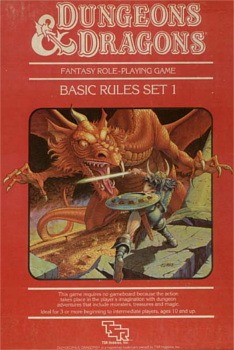 |
These two guys sat in our living room and took copious notes from us on how to make sure the rituals were truly right 'from the book,' (this meaning that they actually came from magic grimoires or workbooks). They seemed satisfied with what they got and left us thankfully. "
-William Schnoebelen, "Straight Talk on Dungeons and Dragons," Chick Publications, retrieved Oct 6, 2015, [chick.com/articles/dnd.asp]
This is not some joke or scare tactic; this is the foundation of D&D. For example, according to the Dungeons and Dragons 3.0 Player's Handbook, a sleep spell requires "Arcane Material Component: A pinch of sand," and according to The Wiccan Spell Manual, a sleep spell requires a "Small bowl of sand."
(See Sirona Knight, The Wiccan Spell Manual, Citadel Press, 2001, p. 157, ISBN: 9780806523576; See also Dungeons & Dragons 3.0 Player's Handbook: Core Rulebook I, Wizards of the Coast, 2000, p. 253)
And he caused his children to pass through the fire in the valley of the son of Hinnom: also he observed times, and used enchantments, and used witchcraft, and dealt with a familiar spirit, and with wizards: he wrought much evil in the sight of the LORD, to provoke him to anger.
-2 Chronicles 33:6
(See M. Singer & T. MacGregor, The Only Book of Wiccan Spells You'll Ever Need, Adams Media, 2012, p. 131, ISBN: 9781440542763; See also Dungeons & Dragons 3.0 Player's Handbook: Core Rulebook I, Wizards of the Coast, 2000, p. 248)
There shall not be found among you any one that maketh his son or his daughter to pass through the fire, or that useth divination, or an observer of times, or an enchanter, or a witch, Or a charmer, or a consulter with familiar spirits, or a wizard, or a necromancer. For all that do these things are an abomination unto the LORD: and because of these abominations the LORD thy God doth drive them out from before thee.
-Deuteronomy 18:10-12
-Erik Ravenswood, The Dictionary of Wicca, Witchcraft and Magick, Booktango, 2013, ISBN: 9781468927320; See also Dungeons & Dragons 3.0 Player's Handbook: Core Rulebook I, Wizards of the Coast, 2000, p. 197)
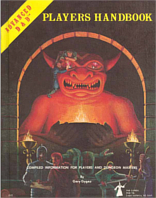 |
These third edition books were the ones I was most familiar with, but of course I found the same things when I investigated the first edition D&D handbooks. For example, the section on druidic magic in the handbook says:" |
This is exactly what a druid must do in real Wicca, almost verbatim:
"The evergreens that we use to decorate our homes at Yule [i.e. Christmas] -- such as pine, mistletoe, and holly -- are pagan symbols of everlasting life...Mistletoe was reputedly ahighly respected magical herb for Druids who collected it only at their high holy days of Midsummer and Midwinter. The Druid priests woulduse a golden sickle to harvest mistletoe from oak trees, which they regarded as teachers and sacred beings. Ancient reports describe how the Druids woulddevise elaborate means to assure that they would cut the herb without touching it with their hands. "
-Timothy Roderick, Wicca, Llewellyn Worldwide, 2005, p. 66, ISBN: 9780738706214; Roderick is a psychologist and experienced witch who founded the EarthDance Collective, a group that promotes feminist witches.
Someone who would claim this is a coincidence would have to be willingly blind and ignorant. The similarities are striking because the testimony of TSR's D&D being based on real witchcraft is true, and children and adults of all ages are learning the ways of the heathen.
Now the works of the flesh are manifest, which are these; Adultery, fornication, uncleanness, lasciviousness, Idolatry, witchcraft... they which do such things shall not inherit the kingdom of God.
-Galatians 5:18-20
Although I've been unable to find the original interview on video, Schnoebelen continues to describe a former TSR employee who resigned from the company after discovering the creators' goal of duplicating witchcraft rituals into the game:"Back in 1986, a fellow appeared on The 700 Club who was -William Schnoebelen, "Straight Talk on Dungeons and Dragons," Chick Publications, retrieved Oct 6, 2015, [chick.com/articles/dnd.asp] |
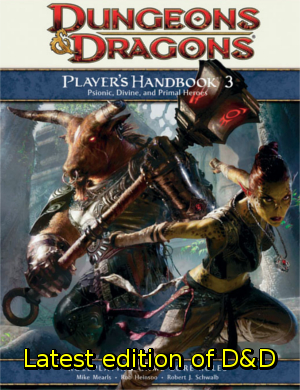 |
In our article "Fantasy Novels: Invitations to Hell," we documented testimonies from witches how they were converted into witchcraft and paganism through books like The Chronicles of Narnia, The Lord of the Rings, Twilight, and of course, Harry Potter. We also documented witches who confessed that their coven initiate numbers were growing significantly after these books were published (and movies released), so it should be no surprise that we find converts to Wicca through D&D, especially since we have just learned that the game was designed on the same foundation.
Sociology professor Kim Hansen describes the Wiccan culture in a pleasant way, and that Mormons and Catholics (and Protestants with a "high church" attitude) "were most likely to say nice things about Wiccans." She goes on to talk about Wiccan chaplains who help young men and women who had gained an interest in Wicca through D&D to develop rituals, and that
(See Kim P. Hansen, Military Chaplains and Religious Diversity, Palgrave Macmillan, 2012, p. 109, ISBN: 9781137025173)
"Therewill always be the select few who will crave more in their studies than learning from books, internet, email andDungeons and Dragons Pagan groups and public gatherings can offer.Those of a serious mind will always seek out a serious religion, and it is my hope that the Keepers of the Flame will be there for them."
-Starspawn, Alexandrian High Priest, quoted by Suzy Smith (Rain Dove), The Tangled Web of Wicca: Through the Eye of a Traditional Wiccan Witch, AuthorHouse, 2014, ISBN: 9781496941220
Not just William Schoebelen, but there are a number of Christian authors who have come out of paganism, testifying that Dungeons & Dragons was one of the contributing factors for their entrance into witchcraft:
"As I entered into my teenage years...I discovered Dungeons and Dragons , which is a role-playing game that allows you to imagine that you use magic and slay beasts with swords. It seemed like a lot of fun, but there was a dark side to this as well.There were demons to be worshipped and gods to be prayed to... Pretty soon I began to make a connection between the fortune-telling of my grandmother with the magic users of Dungeons and Dragons. Because these practices were not forbidden in our family, there seemed no inconsistency... I then discovered Wicca and entered into the practices of white magic. "
-Lonnie Denney, The Burnt Schoolhouse: Overcoming Spiritual Attack, WestBow Press, 2012, ISBN: 9781449744434
It is not a guarantee that everyone who plays D&D will get involved in a witch coven. In fact, most people won't. However, there are a number of testimonies that state D&D is one of the things that helped them in their journey towards Wicca:
"Living in the country, my brother and I had few friends... We were all outcasts... but we all were intelligent. All of us were on the honor roll--intelligent children with too much time on our hands is how I would describe us.I read a lot of books covering subjects such as paranormal psychology, poltergeists, hauntings, exorcisms, demonology, near-death experiences, ESP, clairvoyance, superstitions, astrology , and prophecies by Adgar Casey, the spirit guide Seth, and Nostradamus. You name it, I read it, and the stranger, the better.A normal Saturday morning found my friends and me in our basement eating popcorn and playing Dungeons and Dragons or experimenting with the Ouija board ... One day [in college], our professor announced we were going to have guest speakers discuss their set of beliefs... She said they practiced modern-day witchcraft. We were all fascinated,looking forward to the day we would get to meet actual witches ... There were three Wiccans who came to speak, two women and one young man. They sat at the front of the classroom anddiscussed their beliefs in a god and a goddess, nature worship, reincarnation, symbols and holidays, and pantheism... I hung on every word the guest speakers said, soaking in everything like I was a dry sponge. And indeed I was.I wanted a faith to follow more than anything, and I believed I had found it in them. "
-Shari Hadley, From the Cauldron to the Cross: My Journey from Wiccan to Christian, Redemption Press, 2014, ISBN: 9781632328120
In most cases, D&D is NOT the one single cause of turning to witchcraft, as many church buildings and pastors have tried to falsely teach, but it is a stepping stone for many people who end up seeking to become a witch. Furthermore, since many of the actions taken in the game are designed after real witchcraft, we need to consider the following:
"Now, the question becomes—if a person 'innocently' works an authentic ritual that conjures up a demon, or curses someone; thinking that they are only playing a game-might not the ritual still have efficacy? I think we know the answer to that question.If you play at shooting your friend in the head with what you think is an unloaded pistol and don't know a shell is in the chamber, is your friend any less dead because you were playing? "
-William Schnoebelen, "Straight Talk on Dungeons and Dragons," Chick Publications, retrieved Oct 8, 2015, [chick.com/articles/dnd.asp]
D&D may be a stepping stone that leads a player to many paths in their life, but all of the doors D&D open are away from the Gospel of Jesus Christ, and I can personally testify that all the people I used to know who I played D&D with have become atheist, agnostic, or have adopted other strange religions like Taoism. (And those guys still play D&D today; I'm the only one that doesn't.) D&D had nothing to do with my being saved by Jesus Christ, and sadly, I've been guilty (even after being born-again) of leading people into D&D when I was ignorant of what it was, thinking it was just an innocent pastime.
(Doing things that wound the weaken the conscience of others, either believer or unbeliever, is uncharitable action that sins against Christ. Read "A Biblical Understanding of Charity" here at creationliberty.com for Scripture and more details.)
And for their sakes I sanctify myself, that they also might be sanctified through the truth.
-John 17:19
(i.e. "sanctified" means "set apart")
"ELVES are creatures that figure prominently in the lore of Europe, particularly in England, Scotland, and Scandinavia. In England elves are small fairy-like beings, while in Scotlandthey are often human size . In Scandinavia elves belong totwo classifications: light and dark (good and evil). [Remember this note on light/dark elves because we will mention this later.] The most common concept of elves appears to be derived from Anglo-Saxon folklore in whichelves share qualities of the Celtic sidhe orfairy ...Elves are associated with several sacred trees in which they made their homes... Because these trees were home for the elves, great care had to be taken when cutting from a tree. Permission had to be asked first and then an offering left for the elves in order not to evoke their anger."
-Raven Grimassi, Encyclopedia of Wicca & Witchcraft, Llewellyn Worldwide, 2000, p. 144-145, ISBN: 9781567182576; Grimassi is an award-winning pagan author of eighteen books on witchcraft and wicca, and he has formed and led multilple witch covens.
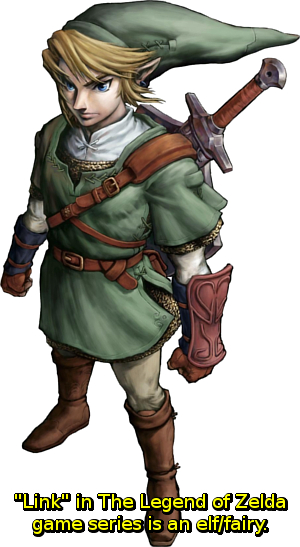 |
Most of you have heard of elves, and know all these things about them, but I want you to consider that most of you didn't learn about them from your schooling as you were growing up; you learned about them from movies, fantasy novels, and video games. Most American church-goers today understand more about elves than they do about the apostles of Christ in the Bible, and they can quote elves in books and movies more than they can quote Scripture. I can tell you from first-hand experience that children today are far more familiar with the pagan stories of elves in video games than they are with the doctrines of the Bible, and the origin of those concepts in video games started with D&D.
For example, the character "Link" from the famous video game series The Legend of Zelda is an elf/fairy. In The Legend of Zelda: Ocarina of Time, the game begins with Link as a young boy growing up in a village of fairies hidden in the woods, and countless pagan concepts are littered throughout the series, including spells, magic relics, and other things we'll cover later in this article. The creator of the series pulled inspiration from games like D&D, and fantasy authors like J.R.R. Tolkien. |
|
We will not cover where the inspiration for D&D came from because we covered that already in "Fantasy Novels: Invitations to Hell - J.R.R. Tolkien & The Lord of the Rings." The motivation behind those games was taken from Tolkien's famous The Lord of the Rings trilogy, and The Hobbit books, all of which came from his influence in the occult, so I would highly suggest the reader click the link and read the documentation before continuing through this teaching. |
The website Den of Geek takes a look back at the original Legend of Zelda for what inspired the creator, Shigeru Miyamoto, to make the game:
"The Legend Of Zelda would project a very different pace and atmosphere. Zelda would unfoldmore like a fantasy novel than a 10-minute thrill-ride, with an open world to explore and a definite, if simple, character arc for its protagonist. Likea compressed dice-and-paper role-playing game [i.e. Dungeons & Dragons], it would contain monsters, dungeons, missions to complete, characters to converse with, and ultimately, an evil villain to be defeated and a damsel to rescue... It’s a direct, bare-bones story, andclearly in the vein of fantasy authors such as Tolkien, but perfect for the technology of the 80s ."
-Ryan Lambie, "The inspiration behind The Legend Of Zelda," Den of Geek, Nov 22, 2011, retrieved Oct 8, 2015, [denofgeek.us/games/zelda/21231/the-inspiration-behind-the-legend-of-zelda]
Another well-known series is called Dragon Quest (or Dragon Warrior for those of us old enough to remember), which was first released on the Nintendo Entertainment System in 1986. This game presents a lone warrior who uses magic spells to fight off monsters like slimes, skeletons, golems, werewolves, and many other "magical" creatures that hold a striking similarity to D&D, and there's a reason for that:
"Designer Yuji Horii created Dragon Quest withinspiration taken from Western RPGs like Wizardry and Ultima ..."
-Nintendo Power Magazine, "Dragon Warrior," Vol. 237-239, Nintendo of America 2009, p.84
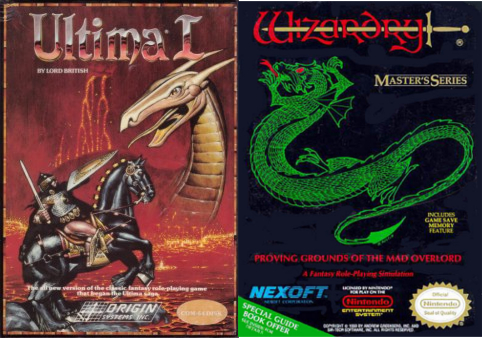
"The firstUltima trilogy [1980] was composed of standard battles withmonsters, dungeon crawls, and treasure seeking derived from Dungeons and Dragons ... Concurrently with the Ultima series, Andrew Green and Robert Woodhead developed theWizardry series, whose first installment was also published in 1981 as Wizardry I: Proving Grounds of the Mad Overlord."
-Jeff Howard, Quests: Design, Theory, and History in Games and Narratives, CRC Press, 2008, p. 16-17, ISBN: 9781439880814
Here's a breakdown of what has led to the majority of video game concepts today:
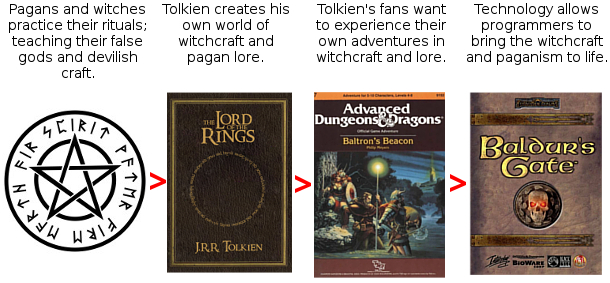
There is a lot more to this than just elves. There are dwarves, ogres, goblins, faeries, trolls, orcs, and much more that we will cover step-by-step as we expose what's going on in the gaming industry today. I simply wanted to give an opening example so everyone can clearly see that witchcraft and paganism is the original source for most of the concepts behind video games today.
In the above image, showing the progression from witchcraft to video games, the game on the end is called Baldur's Gate which became an incredibly popular icon in D&D circles. Baldur's Gate is the name of a city in the game (and in the setting of Forgotten Realms; a book series based on D&D), and Baldur is a Norse god, son of Odin; according to the pagans, Odin is the one that brought the power of magic and runes into the world. (I point this out to demonstrate that even the titles of these games are based on pagan concepts.)
"Balder/Baldur : Known as the Bright One, this Aesir godis a sun deity . He rules over advice, reconciliation, beauty, gentleness,reincarnation , wisdom, and happiness."
-D.J. Conway, Wicca: The Complete Craft, Potter/TenSpeed/Harmony, 2011, p. 73, ISBN: 9780307785893; Conway is an honorary member of the Council of Elders of the Society of Celtic Shamans, and she has studied/written about new-age religions and witchcraft for more than 40 years.
Reincarnation is an emphasis in sun god worship by the pagans because of the sun dying and being reborn. This is all demonstrated in previous articles in which we have shown the witch's wheel of the year.
(Read "Easter: Christians Celebrating Abomination" here at creationliberty.com for more details.)
| The introduction to the game has the hero raised by a wizard, and of course, sorcery is painted in a positive light, not as something forbidden by the Lord God. Many dark practices are portrayed in this game, but it gets much worse in Baldur's Gate II, where the protagonist (leading character) learns that he is the child of Bhaal, which in the fictional series is the god of murder, but Bible students will immediately recognize the close connection to the term Baal. | 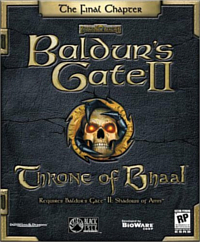 |
"Baal--Male--Middle East... Animal Associations: Bull...'Master,' 'Lord,' or similar translations --Canaanite/Phoenician fertility and storm god. The name'Baal' is also a general term for god. This has led to a great amount of confusion in lore...In the Christian Bible, Baal is directly referred to as Beelzebub, a deliberate slur and attack on Baal-Zebul ."
-A.J. Drew, A Wiccan Bible: Exploring the Mysteries of the Craft from Birth to Summerland, Career Press, 2003, p. 295, ISBN: 9781564146663; Drew hosts the annual "Real Witches Ball," which is one of the largest Pagan gatherings in the U.S., and the owner of Salem West, one of the largest Witchcraft shops in the Midwest.
And they forsook the LORD, and served Baal and Ashtaroth.
-Judges 2:13
And Ahaziah fell down through a lattice in his upper chamber that was in Samaria, and was sick: and he sent messengers, and said unto them, Go, enquire of Baalzebub the god of Ekron whether I shall recover of this disease.
-2 Kings 1:2
If Satan also be divided against himself, how shall his kingdom stand? because ye say that I cast out devils through Beelzebub.
-Luke 11:18
And Elijah came unto all the people, and said, How long halt ye between two opinions? if the LORD be God, follow him: but if Baal, then follow him. And the people answered him not a word.
-1 Kings 18:21
Thou shalt have no other gods before me.
-Exodus 20:3
And he said unto them, Ye are they which justify yourselves before men; but God knoweth your hearts: for that which is highly esteemed among men is abomination in the sight of God.
-Luke 16:15
The heart is deceitful above all things, and desperately wicked: who can know it?
-Jeremiah 17:9
These things hast thou done, and I kept silence; thou thoughtest that I was altogether such an one as thyself: but I will reprove thee, and set them in order before thine eyes.
-Psalm 50:21
Ye shall not do after all the things that we do here this day, every man whatsoever is right in his own eyes.
-Deuteronomy 12:8
Every way of a man is right in his own eyes: but the LORD pondereth the hearts.
-Proverbs 21:2
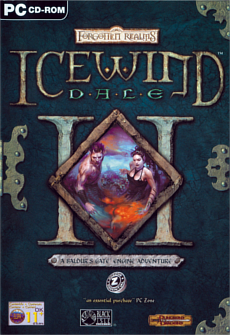 |
Just like D&D, wizards, sorcerers, and druids pick a particular god or goddess to align themselves with, and in games like Baldur's Gate, they will do the same. In the game Icewind Dale 2, another Forgotten Realms series, clerics (pagan priests) must select between the god of torture, the god of rebirth, the god of protection, the god of war, the god of hate, the god of destruction, or the god of knowledge, and whatever they choose becomes the god they must worship in order to draw power to cast their magic. |
Before anyone thinks that scientific space shooter games are left out of this pagan concept, let's look at Nintendo's Star Fox, created by Shigeru Miyamoto (previously mentioned as the creator of Legend of Zelda). At E3, Miyamoto once again reminded everyone what inspired his creation of Star Fox:
|
Miyamoto: "I live right by the Fushimi Inari Shrine. |
This Inari Shrine is still worshiped by pagans today as a merchant god that brings fortune. In the video, the wooden triangle-shaped boards they paint on are prayer boards offered to the fox god (i.e. a messenger god).
"Star Fox Zero is the forthcoming reboot of the titular franchise from creator Shigeru Miyamoto and Nintendo.Originally based on a flying fox God shrine seen by the creator, which was positioned between a series of arches that inspired the original title’s core gameplay mechanics and aesthetic representation , the series has since inspired six independent titles on multiple platforms,"
-Sean K. Cureton, "New Star Fox Game For Wii U Gets Official Release Date," ScreenRant, Nov 11, 2015, retrieved Nov 26, 2015, [screenrant.com/star-fox-wii-u-release-date-nintendo]

The fox god shrine is called Fushimi Inari Taisha:
"Miyamoto: Star Fox has a lot of scenes in which the fighter goes through arches, which reminds one of the gates at Shinto shrines called torii. And torii made me think of the thousands of such gates at Fushimi Inari Taisha. (Nintendo adds the following note) [Fushimi Inari Taisha: The head shrine of all the Inari Shrines in Japan dedicated to the god Inari. It is known for paths lined with a thousand vermillion torii gates and imagery of fox which is the messenger of Inari God. ] In a prototype, there were lots of scenes like going through there. And when you think of Fushimi Inari, you think of foxes.
Iwata: Oh, so that was the train of thought that led to a fox! (laughs)
Miyamoto: Yeah. (laughs) Fushimi Inari Taisha is about a 15-minute walk from our former head office"
-Satoru Iwata, interview with Shigeru Miyamoto, "Iwata Asks: Starfox 64 3D," Nintendo, retrieved Nov 26, 2015, [iwataasks.nintendo.com/interviews/#/3ds/starfox/0/2]

Although some types of games will make up their own names to represent gods and goddesses, other games copy the traditional names of gods and goddesses. The Final Fantasy series produced by Squaresoft (and later SquareEnix) has done this for decades with their "summoned" monsters in a form of witchcraft magic used in the game to summon a protective being.
Odin, the Norse god of witchcraft mentioned earlier, is a common theme in many of their games. Fans of the Final Fantasy series have begun to expect this character in the games hidden somewhere in the story:
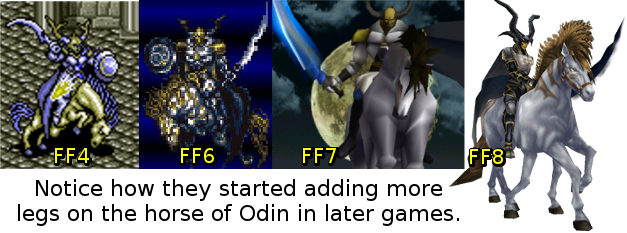
The reason they started with a normal horse and later added more legs is because Odin's horse has a total of eight legs according to Norse pagan lore, or in other words, they're trying to make their "god" look at close to the pagan concept as possible. In "Christmas: The Rejection of Jesus," we explain that the eight legs of the horse of Odin is the reason Santa Claus is represented with eight reindeer, because Claus was modeled on the myths of Odin, and that same reflection is seen in Squaresoft's work with the Final Fantasy series.
It should be no surprise that Final Fantasy's inspiration comes directly out of D&D after seeing its pagan roots. The following quote is from a website devoted completely to Final Fantasy, and they did an extensive and detailed comparison between D&D and Final Fantasy, creating a list of over 120 monsters that Final Fantasy copied from D&D:
"The world of old Final Fantasy is populated almost entirely with critters lifted straight from 1st edition AD&D [Advanced Dungeons & Dragons]... we've got old-school D&DElves and Dwarves, which were borrowed from (and changed from) those of Tolkien’s Middle-earth . Astos [a character in FF1]the 'Drow Elf' is a dead giveaway: drow elves were a D&D creation . So too wereBahamut the Platinum Dragon, patron of lawful good heroes, andTiamat the five-headed dragon, patron of chaotic evil; both were drawn fromArabic and Babylonian legends ,"
-Let's Play Final Fantasy, "Discussion: Final Fantasy’s D&D Origins," Jan 20, 2013, retrieved Oct 22, 2015, [finalfantasy.istad.org/2013/01/final-fantasy-vs-dnd]
Of course, the dark and light elf concept is drawn directly from witches:
"There appears to betwo broad classifications of Elves: light Elves and dark Elves . Light Elves are more likely to interact with humans, while dark Elves, although not directly harmful, do not care for human company.Light Elves prefer light, airy spaces for their colonies. Dark Elves prefer dark, gloomy places. "
-D.J. Conway, Wicca: The Complete Craft, Potter/TenSpeed/Harmony, 2011, p. 99, ISBN: 9780307785893; Conway is an honorary member of the Council of Elders of the Society of Celtic Shamans, and she has studied/written about new-age religions and witchcraft for more than 40 years.
This is why many games (as well as books, movies, etc) that contain the pagan elf concept have both light and dark elves. For example, the game Lineage 2:

Notice that the "Let's Play" article above also pointed out Bahamut, which is one of the most famous summon monsters in the Final Fantasy series. Bahamut is always typically the most powerful, and the concept for this creature is drawn from a page right out of the Forgotten Realms series.
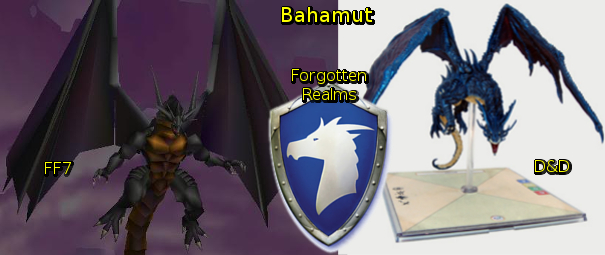
There are more examples in the Final Fantasy series than these, but some I do not believe are appropriate to show on this website. They have a summon called "Shiva," which is named after the pagan Hindu god, and is one of their most highly esteemed out of the pantheon of false gods they have collected, but since this game series portrays Shiva as a female with very little clothing, I will not put images of it here.
Some people will want to excuse these things away by saying that the creators of these games just wanted to use the names because they sounded cool, or something along those lines, but I want to emphasize this for all the readers: The people who write the scripts and designed the monsters and characters in these video games have some intimate knowledge about the pagan concepts behind them; in other words, you're being entertained by witches and occultists. We will cover a number of examples to prove that point throughout this teaching, but in this specific instance for the Final Fantasy series, these monsters were originally called "summons," but in the early 21st century, the designers started calling them "Aeons."
|
Exposing Gnosticism would take an entire teaching all on its own, and so we will not cover it much here. I will be using some terms many of you will not fully understand, but I simply want you to know that this is a wide-spread cult that permeates into many books, movies, and video games. In short, Gnosticism is a heresy that teaches Christ is not the Son of God, and His sacrifice on the cross did not redeem those who believe, but rather Christ was a "lesser divinity" or messenger of a supreme divine being who spread special divine knowledge only to a select few who could interpret it, and that secret knowledge allows the spirit of man to redeem itself. It is very difficult in a short few paragraphs to fully explain to the reader how deeply Gnosticism has infiltrated religions around the world, but know that there is what's called a "Gnostic Catholic Church," which is an extension of an organization called Ordo Templi Orientis, that had infamous Satanist Aleister Crowley as one of its members. Crowley wrote a book on Gnosticism in relation to his Satanic practices, called Liber XV: Ecclesiae Gnosticae Catholicae Canon Missae O.T.O. (OTO is Ordo Templi Orientis), and I am confident that should give born-again Christians a fairly good idea of how wicked these doctrines are. (Read "What's Wrong With Christian Rock?" here at creationliberty.com for more details on Aleister Crowley.) It was through these writings that today there is a cult of witches who practice what's called "Aeon Magick." There is a book called New Aeon Magick: Thelema Without Tears (Thelema is the name of the order started by Satanist Aleister Crowley), and in the description, it says: "Finally, a basic yet -Gerald Del Campo, New Aeon Magick: Thelema Without Tears, Luxor Press, 2000, ISBN: 9781891948022 In Gnosticism, Aeons are divine beings that are lesser extensions of a "supreme god" and given names like Bythos, Proarkhe, or Sophia (which means 'wisdom'). Gnosticism has even attempted to merge its way into Christian doctrine by calling one of their aeons Christos (the anointed one) after Christ. These Aeons serve as gods/goddesses for invoking the Gnostic's magical power, and/or as mediators between man and their so-called "supreme god." |
For example, one of the "Aeons" in Final Fantasy X is called "Ixion:"
"Ixion... attempted to seduce Hera [Greek goddess]. Zeus [Greek god], astonished at this audacity, fashioned a replica of Hera from a cloud and sent her to Ixion's bed... After that he was punished by being chained to a fiery wheel revolving forever in the Underworld.The cloud--Nephele--later gave birth to the first centaur. "
-K.M. Sheard, Llewellyn's Complete Book of Names for Pagans, Wiccans, Witches, Druids, Heathens, Mages, Shamans & Independent Thinkers of All Sorts who are Curious about Names from Every Place and Every Time, Llewellyn Worldwide, 2011, p. 298, ISBN: 9780738723686; Sheard is member of a Druidic coven and the British Pagan Federation.
It was through this Ixion's fornication that was said to bring about centaurs, which can be found in just about every fantasy game (and movie) in existence.
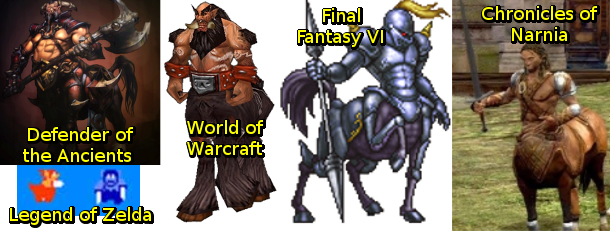
There is another aeon in Final Fantasy X called "Anima," which in paganism is referred to as a "revered superhuman" quality that people will worship, such as the "the hair from the head of Muhammad" for the Muslims.
(See Michael York, Pagan Theology: Paganism as a World Religion, NYU Press, 2005, p. 140, ISBN: 9780814797082; York is a highly-respected lecturer and director of the Sophia Centre for the Study of Cultural Astrology.)
Many of these connections are unknown to the average player because they are ignorant of paganism, and often just see it as creative writing.
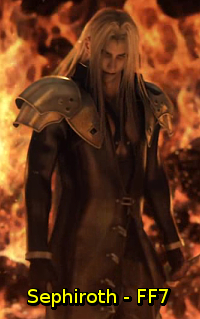 |
Please take a moment to carefully consider that I had to go study these subjects to understand what Aeons are, so do you believe it is simply a coincidence that the creators of the Final Fantasy series just happened to name these summoned creatures "Aeons?" Or did the authors of these games name them "Aeons" because they are intimately familiar with witchcraft and Gnostic doctrine, and likely have their own witchcraft and Gnostic beliefs?
Some people will think I'm stretching quite a bit to make the connection of Gnostic belief with the authors. As I said earlier, I can't cover every single example in this one article because there are far too many, however, this example may help to shed some light on this subject: One of the most famous and best-selling Final Fantasy games in history was Final Fantasy VII released in 1997, and the "bad guy" in the game was named "Sephiroth." |
This Gnosticism dictionary states:
"sefirah: (p.l. sefirot,sephiroth ) One of the ten nodes of the Tree of Life in Kabbalah, each of which isan emanation of God ."
-Andrew P. Smith, A Dictionary of Gnosticism, Quest Books, 2014, p. 223, ISBN: 9780835630979
The Sephiroth is part of the Kabbalah, which is Jewish witchcraft and mysticism. In Gnosticism, aeons are commonly called "emanations of God:"
"Theseaeons are emanations from God's central fulness, are embodiments of his divine attributes , and fulfil the functions denoted by their several names."
-George Ripley, The New American Cyclopaedia: A Popular Dictionary of General Knowledge, Nabu Press, 2012, p. 319, ISBN: 9781276653978
The Gnostics believe that Christ of the Bible is a culmination of the ten Sephiroth, and that whoever "self-realizes" the ten Sephiroth will receive the light of their false christ:
"WhosoeverSelf-realizes the ten Sephiroth will shine in the world of the Light with ineffable Christic splendors . When the Ancient of Days reaches the realization of the ten Sephiroth in himself, these Sephiroth shine in the world of Light as precious gems, as resplendent stones within the body of the Ancient of Days."
-Samuel A. Weor, "What are Sephiroth?" Gnostic Teachings, retrieved Oct 13, 2015, [gnosticteachings.org/faqs/kabbalah/781-sephiroth.html]
After looking a little more closely into this, I made this image to show the connection between Gnosticism and the creators of Final Fantasy VII:
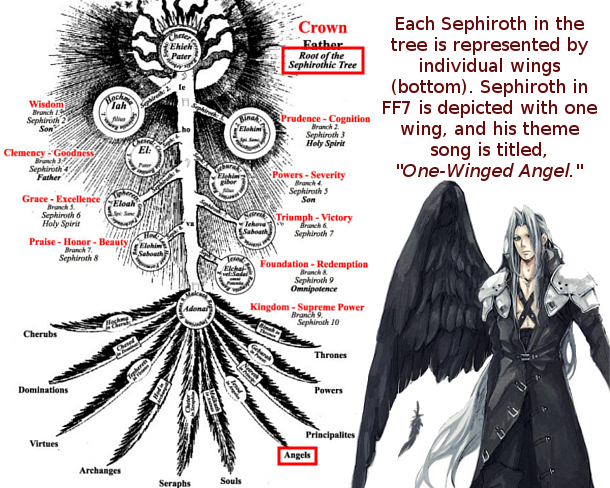
The sephiroth and aeons are the "gods" and "goddesses" of this world, according to Gnosticism, connected to a "supreme being" by his/her radiant energy. These concepts are perfectly in line with all the concepts of witchcraft, which is why there is a large sect of "gnostic witches" today.
While looking over the diagram above, consider the following script spoken by Sephiroth in Final Fantasy VII:
"Sephiroth: So you opened the door. Well done.
Tseng: This place...what is it?
Sephiroth: A lost treasure house of knowledge.The wisdom of the Ancients ... You stupid fools. You have never even thought about it.All the spirit energy of this Planet. All its wisdom, knowledge; I will meld with it all. I will become one with it; it will become one with me. "
-Final Fantasy VII Script, "Temple of the Ancients," retrieved Nov 3, 2015, [letao.is-a-geek.net/ff7script/part13.html]
This is all based on the concept that understanding the Sephiroth in Gnosticism will make one into a divine and powerful being. Learning Gnosticism would be very difficult for someone who has no background and understanding about its teaching, but for someone who has played some Final Fantasy games, they would have a slight headstart over others when adopting Gnosticism because not only are they familiar with a few of its concepts, but they can also visualize it in their minds through the characters and events of the game, or in other words, they are preconditioned for Gnosticism.
No matter what excuses a person wants to make to justify the things they enjoy, one would have to willingly blind themselves to say that the authors of these scripts and characters do not have an intimate knowledge of new-age religions. The real question is, if those authors are not part of those new-age religions, why are they spreading its doctrines through video games?
|
Video games educate. Every subtlety implies things that teach. It seems no one wants to admit it, but music, movies, videos, books -- they're all part of education, and what you initially learn affects how you will view the world and the things in in the world throughout your life. A child can learn that witchcraft is evil in the sight of God, and later is more likely to depart from anything involved in witchcraft. A child can learn that witchcraft is beneficial and acceptable practice, and later is more likely to get involved in it, or at the very least, end up believing it's harmless. There is danger from movies, books, and games because they lead people to joining the occult, as I've documented many testimonies on this website in multiple articles, but one of the biggest dangers is the conditioning that witchcraft is just "harmless fun." Is idolatry harmless fun? Is drunkenness harmless fun? Is fornication, murder, and theft harmless fun? The problem is that these authors and developers are helping to create a generation that becomes indifferent towards sin because MANY games not only have loads of witchcraft, but they allow the player to murder, steal, fornicate, and get drunk. The Lord Jesus Christ is disgusted by those who "ride the fence" (i.e. won't take one side or the other):
So then because thou art lukewarm, and neither cold nor hot, I will spue thee out of my mouth. For example, the wicked false preacher Kenneth Copeland claims to be a Christian, and he deceives far more people than founder of the First Church of Satan, Anton LaVey. At least LeVey did not disguise himself and clearly presented himself as a wolf, but Copeland simply dresses like a sheep and leads the masses into destruction. If you can train a child that sin is meaningless, then that child will grow to think sin is acceptable, and is much more likely to participate in that sin. So when a child learns that witchcraft (and many other sins) is just fun and harmless button clicking that makes sparkling effects on his TV screen, he is not being trained to understand the truth, and instead believes in a lie that makes him feel good.
Wherefore the law was our schoolmaster to bring us unto Christ, that we might be justified by faith. Of course, the church-goers who participate in D&D and other such video games will continue to make excuses that it's all just imagination and that they know these things don't exist, but this is precisely what we went over in "A Biblical Understanding of Charity." We showed that the Word of God teaches us to consider not ourselves, but others first and foremost if we are to be charitable.
As concerning therefore the eating of those things that are offered in sacrifice unto idols, we know that an idol is nothing in the world... Howbeit there is not in every man that knowledge: for some with conscience of the idol unto this hour eat it as a thing offered unto an idol; and their conscience being weak is defiled... But take heed lest by any means this liberty of yours become a stumblingblock to them that are weak... And through thy knowledge shall the weak brother perish, for whom Christ died? Examine yourselves, whether ye be in the faith; prove your own selves. Know ye not your own selves, how that Jesus Christ is in you, except ye be reprobates? -2 Corinthians 13:5 Furthermore, Aleister Crowley, the sodomite pedophile witch who paved the way for Satanism in the 20th century, wrote in his book:
|
I am very aware that I will be laughed off by many gamers in their ignorance, but those authors who take their game design seriously will understand many of the connections I've already brought to light in this article. For example, the following book is called Game Magic: A Designer's Guide to Magic Systems in Theory and Practice, and on the back cover it reads:
"Make More Immersive and Engaging Magic Systems in Games -- Game Magic: A Designer’s Guide to Magic Systems in Theory and Practice explains how to construct magic systems and presents a compendium of arcane lore, encompassing the theory, history, and structure of magic systems in games and human belief. The author combines rigorous scholarly analysis with practical game design advice in the form of a magical recipe book (grimoire).The book gives you an in-depth understanding of the history and structure of magic to make your games richer and deeper. It shows how to set up tables of correspondences and spell components as well as how to write programming code integrating these components as part of game mechanics. It also illustrates how to divide a simulated world into domains of influence (such as alteration, conjuration, and necromancy) and how to use specific rule systems to simulate powers within these realms. "
-Jeff Howard, Game Magic: A Designer's Guide to Magic Systems in Theory and Practice, CRC Press, 2014, ISBN: 9781466567870
This author has directly studied the works of Aleister Crowley in research for his games, and quotes him in his book. He then says:
"Occult magic is useful for game designers because when a group of people believes in the reality of contacting and manipulating mystical forces, they often invest intense energy into assuring that their magical system is coherent and workable. Occult magic consists of systems of interactive practice in the real world, involving imaginative voyages and quests into other dimensions that parallel those of gamers into virtual worlds.Regardless of whether or not occult magic is real, its coherent systems of performance and practice make it a useful source of inspiration for game designers. Occult magic allows us as designers to invest our games with a deep sense of authenticity and internal coherence, allowing us to remain agnostic about the metaphysical content of our games as long as it deepens and enriches players' experiences."
-Jeff Howard, Game Magic: A Designer's Guide to Magic Systems in Theory and Practice, CRC Press, 2014, p. 5-6, ISBN: 9781466567870
To summarize, he said that studying and applying real-life occult witchcraft into video games is useful for designers, specifically so they can immerse themselves into their work because it will be "authentic" and "coherent" magic. He then says players can remain indifferent about whether or not it's real, so long as they have a good time, but we just read from Aleister Crowley that it does NOT matter what the player believes; it only matters that he/she participates in the rituals, and that's enough to invoke the results.
Going a bit further into this author's book, he warns readers about people like me:
"The investigation ofoccult magic in conjunction with game magic is likely to be controversial in some circles because of the condemnation of games, especially tabletop role-playinggames like Dungeons & Dragons, as Satanic because they supposedly encourage ritualistic behavior ."
-Jeff Howard, Game Magic: A Designer's Guide to Magic Systems in Theory and Practice, CRC Press, 2014, p. 6, ISBN: 9781466567870
When he says "ritualistic behavior," he's talking about the rituals of witchcraft. His response for this is yet another reason why I encourage true born-again Christians to sanctify themselves from all things having to do with the Roman Catholic Church.
He writes about the "fundamentalist Christians" who "attacked" witchcraft connections in games, that these people claim these games are not compatible with Christian doctrine, but then he says:
"[T]hough perhaps not with early Christianity [i.e. Catholicism], which co-existed with ancient Roman and Greek mystical beliefs and magical practices. "
-Jeff Howard, Game Magic: A Designer's Guide to Magic Systems in Theory and Practice, CRC Press, 2014, p. 6, ISBN: 9781466567870
As a side note, I should mention that in my research I found this author's autobiography called From Fear to Freedom, in which he describes himself coming out of being raised on a religious commune and freed from "fear of God, Satan, and evil spirits." The problem is twofold, first that he was likely involved in an unbiblical cult (claiming to be Christians but were not) that did not preach the truth to begin with, and second that he went from one extreme to the other, settling into an agnostic worldview that blinds him to the truth about witchcraft and the occult.
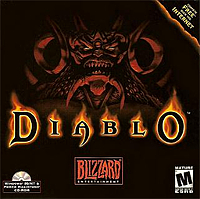 |
It gets much worse when we turn to companies like Blizzard Inc, that produced a game almost 20 years ago (1996) called Diablo. 'Diablo' means 'devil', and the purpose of the game was to use witchcraft in combat, traveling deeper into the earth through catacombs and caves, to eventually enter the depths of hell and battle with sorcerers and the devil, or who would be later referred to as "The Lord of Terror." |
At the end of the game, the "hero" (i.e. your playable character) retrieves a "soul stone" in which the hero must thrust into his/her own body in order to contain the devil and prevent the lord of terror from entering the world again. As the story progresses into Diablo 2, the hero cannot control the devil, becomes completely possessed, and eventually becomes the new lord of terror. During this game, players must battle against other demons like Baal and Mephisto, which are all names/personifications of Satan.

The Diablo series is full of Satanism, witchcraft, necromancy, sorcery, divination, fornication, murder, theft, and everyone's favorite--destruction. However, what I want to focus on is Diablo 3, in which the player plays as a nephilim with supernatural powers.
The King James Bible does not use the term "nephilim," which is a Hebrew term that is often difficult to describe even by those who live in Hebrew culture, but it refers to a half-demon/half-man race of creatures, which is often attributed to a race of giants from Genesis 6: The Bible describes them as a strong race of half-demon/half-man creatures in Genesis:
There were giants in the earth in those days; and also after that, when the sons of God came in unto the daughters of men, and they bare children to them, the same became mighty men which were of old, men of renown.
-Genesis 6:4
In this short video, the authors of the Diablo series tell the audience that they draw inspiration for their story, people, and places in the game from religions around the world. They also say they have heavily drawn from the "Judeo-Christian religion" ("symbols and icons" in it, which is actually Catholicism and Jewish mysticism) for some of their foundational concepts concerning angels, demons, and nephilim:
|
Kindreagan: " Chu: |
Please take careful consideration of what these men just said because most people just glance over this without thinking specifically on their general point. The inspiration for these games is drawn from the world and from worldly false religions that are an abomination to the Lord Jesus Christ, and their purpose is to take what they personally find interesting (what's good in their own eyes), and apply that to their game, which in turn educates children and adults alike into the occult.
Ye shall not do after all the things that we do here this day, every man whatsoever is right in his own eyes.
-Deuteronomy 12:8
Thus saith the LORD, Learn not the way of the heathen, and be not dismayed at the signs of heaven; for the heathen are dismayed at them.
-Jeremiah 10:2
All things are lawful for me, but all things are not expedient: all things are lawful for me, but all things edify not.
-1 Corinthians 10:23
expedient (adj): fit or suitable for the purpose; proper under the circumstances
(See 'expedient', American Dictionary of the English Language, Noah Webster, 1828, retrieved June 21, 2015 [webstersdictionary1828.com])
(Read "A Biblical Understanding of Charity" here at creationliberty.com for more details.)
|
Evolutionism is a common theme in video games, and sometimes even video games combining Evolutionism and witchcraft together. I'd like to list out a few of them for example, starting with Squaresoft's/SquareEnix's Chrono Trigger, another one of their best sellers back in 1995:  A few years earlier, Nintendo released E.V.O.: Search for Eden, in which the player assumes the role of a creature that evolves its body over the course of a billion years. Even a game like this completely centered around Evolutionism can't seem to keep away from pagan concepts. The game introduction says:
A "human" evolves after the long journey, and of course you'll notice they skip the "life evolving from non-living material" because that's nonsense no evolutionist can explain: 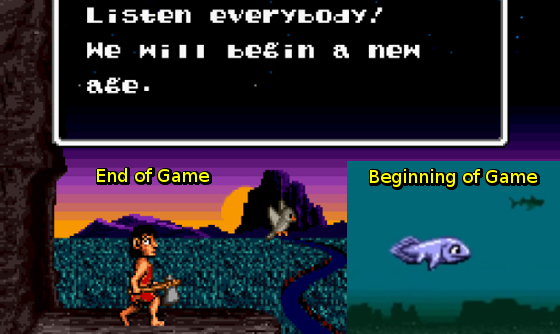 The game Spore is another evolutionary-based game in which you play as alien life that is seeded on a planet. Again, it doesn't deal with life coming from non-living material; it just handles it in the manner of life coming from somewhere else, which simply begs the question. This is a short video clip showing the evolution of the player from cell into brain into legs to walk onto land: |
This new-age occultism in games follows the same pagan pattern from game to game, not because they are copying one another directly, but because they are copying the pagan roots from which they all draw inspiration. More evidence of this is found in use of the name "Lillith," (sometimes spelled "Lilith") which has appeared in many games over the years, including the Diablo series we just mentioned.
Most games that use a "Judeo-Christian" basis for their story and characters end up with a "Lilith" character of some sort, which is a wicked doctrine of Jewish mysticism. It's claimed that Lilith was the first wife of Adam, made from the same earth he was made from, and God made Eve because Lilith left Adam to have children with an archangel, from which would produce demonic children or demi-gods.
In the book Liber Templi Satanas (i.e. Book of the Temple of Satan), Lilith is proclaimed to be the God-Mother of Wicca:
"LILLITH -- She is the Goddess of Soma's third garden, this spirit can give wisdom in plants and trees. She knows all healing herbs and remedies.She is the God-Mother of Wicca and similar crafts. "
-Tom Harper, Liber Templi Satanas, Dorrance Publishing, p. 110, ISBN: 9781434952394; Harper studied under Aliester Crowley, and believes that "Satan is the ultimate symbol of liberty and individuality."
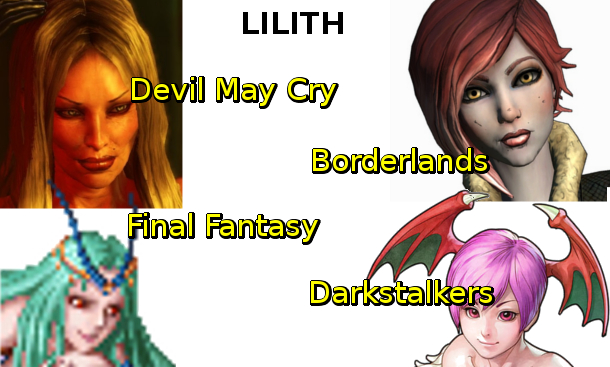
However, one way or another, Lilith is always associated with Hebrew lore because it comes from the Jewish Talmud:
"Asmodeus has his roots in ancient Persia. He is identified with demon Aeshma, one of the seven archangels of Persian mythology. The Hebrews absorbed him into their mythology, where he attained the highest status andmost powerful of all demons in Hebrew legends . According to the Hebrews... [he] was part of the seraphim, the highest order of angels, but fell from grace.In other Hebrew legends, he is either associated with or is the husband of Lilith, the demon queen of lust. Sometimes he is said to be the offspring of Lilith and Adam. "
-Rosemary Guiley, The Encyclopedia of Witches, Witchcraft and Wicca, Infobase Publishing, 2008, p. 96, ISBN: 9781438126845
For example, the name "Lilith" is used in a game called The Binding of Isaac, which obviously has some church-inspired concepts. The author of this game wrote an article about why he created it and the inspiration behind it:
"When I designed Isaac's story and overall theme, I went in wanting to talk to the player about religion in a manner I was comfortable with -- that is, withdark humor and satire ... I grew up in a religious family. My mom's side isCatholic , and my dad's side is born-again Christians. The Catholic side had this very ritualistic belief system:My grandma could essentially cast spells of safe passage if we went on trips, for example, and we would light candles and pray for loved ones to find their way out of purgatory, and drink and eat the body and blood of our savior to be abolished of mortal sin . As a child growing up with this, I honestly thought it was very neat -- very creative and inspiring. It's not hard to look at my work and see thatmost of the themes of violence actually come from my Catholic upbringing, and in a lot of ways I loved that aspect of our religion. Sadly, the other side of my family was a bit more harsh in their views on the Bible;I was many times told I was going to hell for playing Dungeons & Dragons and Magic: The Gathering (in fact, they took my MtG cards away from me), and generally condemned me for my sins. I wanted Isaac to embody this duality I experienced with religion.I wanted it to show the positive and negative effects it had on me as a child -- the self-hate and isolation it instilled in me , but also the dark creativity it inspired. The Bible is a very good, creatively written book, and one of my favorite aspects of it ishow so many people can find different meanings in one passage . I wanted Isaac to have this in its story as well, which iswhy the game's final ending(s) have many possible interpretations ."
-Edmund McMillen, "Postmortem: McMillen and Himsl's The Binding of Isaac," retrieved Nov 4. 2015, [gamasutra.com/view/feature/182380/postmortem_mcmillen_and_himsls_.php?print=1]
In summary, we have a man whose childhood consisted of two different religious teachings founded in false doctrine. On the one hand, he had ritualistic Catholicism and its abominations, and on the other, he had some people claiming to be born-again teaching him that he goes to hell because he played a card game. Obviously, there are numerous problems with what he was taught.
Specifically, I'd like to point out the so-called "born-again" side, which I don't believe were actual born-again Christians based on his testimony. All men end up in hell without Christ because:
As it is written, There is none righteous, no, not one:
-Romans 3:10
For all have sinned, and come short of the glory of God;
-Romans 3:23
From these wicked doctrines and examples, comes the introduction to his game:
This is a display of the demented perception he has of his family's so-called "Christianity," and it's this lackadaisical view on what most people call "religion" that is precisely the Devil's plan. Satan wants people to be confused by all the worldly religion and false converts posing as "Christians."
All the games I've previously mentioned have a light-hearted uncaring view on "religion" being ignorant of the truth, and so they create worlds of fable that not only spread more confusion, but also help players take an indifferent view on witchcraft. Even though he claims to draw inspiration from the Bible, the author of The Binding of Isaac actually draws a lot of his inspiration from witchcraft.
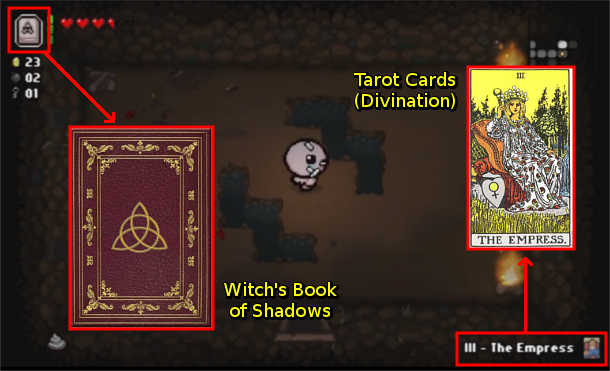
Remember at the beginning when I pointed out that one game is built from inspiration from a previous game, which was inspired from a previous game that was inspired from D&D? The author tells us his game was inspired by games like Diablo and The Legend of Zelda:
"I wanted to combine the roguelike formula with some kind of real-time experience, like Spelunky, but I also wanted to experiment more with the traditional role-playing game aspect of roguelike games Crawl andDiablo . Fortunately, using the basicLegend of Zelda dungeon structure as the game's skeleton made it easy to rework,"
-Edmund McMillen, "Postmortem: McMillen and Himsl's The Binding of Isaac," retrieved Nov 4. 2015, [gamasutra.com/view/feature/182380/postmortem_mcmillen_and_himsls_.php?print=1]
As I pointed out earlier, one of the playable characters is "Lilith," so that means he's looked into Jewish mysticism for his inspiration as well.
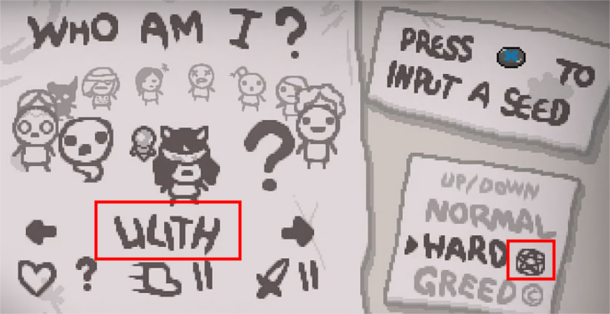
Going back to the Diablo series, the authors said they took what was "interesting" out of Jewish mysticism and applied it to their game. According to the game story, Lilith is the daughter of Mephisto (another name for Lucifer), and her sexual intercourse with an archangel led to the creation of the first Nephilim.

With all this in mind, let's go back to the video Q&A with the Diablo 3 panel and read the answer to another question that was asked:
|
AUDIENCE: " Kindreagan: " Boyarski: "As we noted in Diablo III, the Nephalem aren't in the Books of Fate. So basically Kindreagan: "Michael?" Chu: "No. That was a good answer." |
This is based on the idea that there would be a return of these nephilim half-demon people, but this is taken from many evangelists and pastors that don't understand Scripture and take it far out of it's context and meaning. The nephilim is taught in many church-ianity circles as a definite event that will take place, but I would encourage Christians to read Luke 17 slowly and carefully:
And as it was in the days of Noe, so shall it be also in the days of the Son of man.
-Luke 17:26
There were giants in the earth in those days; and also after that, when the sons of God came in unto the daughters of men, and they bare children to them, the same became mighty men which were of old, men of renown.
-Genesis 6:4
They did eat, they drank, they married wives, they were given in marriage, until the day that Noe entered into the ark, and the flood came, and destroyed them all. Likewise also as it was in the days of Lot; they did eat, they drank, they bought, they sold, they planted, they builded; But the same day that Lot went out of Sodom it rained fire and brimstone from heaven, and destroyed them all. Even thus shall it be in the day when the Son of man is revealed.
-Luke 17:27-30
Just like the Jews adopted a pagan story of Lilith and put it in the Talmud, so these authors are taking pieces of the Bible, twisting and creating their own doctrines out of it. Of course, people will argue "it's just fiction" or "it's just for fun," but in the video above, I only picked out a few clips to show for the sake of time and context, because if you watch the entire video, you can see the obsessed fans drooling over the every word of these authors, wanting more and more all the time. Remember that video games do educate, and when these authors are entertaining a mass of people who do not study the Word of God to gain the Lord's understanding of the truth, then whatever they learn from games like Diablo will be their foundation for knowledge of Scripture.
This is the same reason I've personally been so heavily against "Christian" fiction novels. The author uses the Bible for a rough foundation, but the book is always written through the eyes of the author, and the story ends up reflecting the deceitful heart of the man/woman, rather than telling the truth of the Word.
Every way of a man is right in his own eyes: but the LORD pondereth the hearts.
-Proverbs 21:2
The heart is deceitful above all things, and desperately wicked: who can know it?
-Jeremiah 17:9
Ye have lived in pleasure on the earth, and been wanton; ye have nourished your hearts, as in a day of slaughter.
-James 5:5
|
Although some Christians may want to keep themselves and their families away from video games altogether after reading this article, others may not entirely turn away from games, as there are some out there which don't have any connection to witchcraft. (Things like Wii Tennis for example.) Whatever you decide to do for the sanctification of your home, I have to urge a strong warning to Christians not to get involved in what are called Massive Multiplayer Online Role Player Games (MMORPGs, or MMOs for short).  MMOs are probably one of the most addictive things that video games have to offer, literally creating an entire world in which you create a character and role play as that character in a fictional dimension. Many people who have come out of MMOs (even unbelievers) will tell you that it almost destroyed their lives because they would spend all their free time inside the fictional world, disconnecting with friends and family in the real world because all they would ever be willing to talk about was the MMO world. A man name Glenn posted his story of growing up with his father as a very successful contractor who inherited millions and ran businesses, and later when he was older joined the military, was in great shape, and financially sound. Things were going well until he found an online game called Everquest, and he now lives in debt in his sister's basement, only leaving the house twice a month: "We had planned to pay everything off with our tax returns but they just were not enough. We only managed to pay bills. -Glenn, "Massive Multiplayer Online Games Have Ruined My Life – The Addiction I Can Not Break," Apr 6, 2007, retrieved Nov 10, 2015, [onlinegamerslife.blogspot.com] Another man confesses his life destroyed by MMOs. His roommate got him an MMO as a Christmas present to help cheer him up after his girlfriend broke up with him: "I had been a confident and outgoing young man who enjoyed hanging out with my friends... Now my social dealings involved helping online friends camp a rare monster spawn, or discussing class balance on my guild's chat channel. Going outside was only necessary when I ran out of smokes or beverages. -Mike Fahey, "I Kept Playing — The Costs Of My Gaming Addiction," Kotaku, Oct 19, 2009, retrieved Nov 11, 2015, [kotaku.com/5384643/i-kept-playing--the-costs-of-my-gaming-addiction] Depression is a frequent cause for people getting involved in MMOs. Eventually, it consumes their every thought: "If I wasn't asleep or at work, I was playing EverQuest. The former was becoming a rarity... In January of 2001, -Mike Fahey, "I Kept Playing — The Costs Of My Gaming Addiction," Kotaku, Oct 19, 2009, retrieved Nov 11, 2015, [kotaku.com/5384643/i-kept-playing--the-costs-of-my-gaming-addiction] There is no shame in moving in with your family when you fall on hard times, but moving in with your parents because you've let your life go to ruin over a video game -- it's time to distance yourself from the internet altogether: "Well long story long now ending shortly is I became lvl 50 pretty fast on the server. In fact I was the 5th over all and the first half elf. I was awesome. I had the sword that sparkled and all my cool gear... I would roll up into town and newbs everywhere would just be in awe. I ruled the world, or this virtual one anyway. Meanwhile my real life had fallen apart. -"I Am A Rocovering Addict of MMORPG Games," ShoeMoney, retrieved Nov 11, 2015, [shoemoney.com/2008/08/03/i-am-a-recovering-addict-of-mmorpg-games] The cases get more extreme as we investigate deeper. Some people have died of malnutrition over MMOs: "Last year, the international wires picked up the unbelievable story about a teenage Taiwanese gamer who, -Adriana Lee, "21-year-old Chinese Gamer Dies After 40-hour MMO Session," TechnoBuffalo, Jan 18, 2013, [technobuffalo.com/2013/01/18/21-year-old-chinese-gamer-dies-after-40-hour-mmo-session] The "role play" aspect has taken on a very detailed life of its own, and many MMOs not only have quests designed to be accomplished through sin (e.g. theft, murder, etc), but they also consist of communities that fornicate through "cyber sex." World of Warcraft has an example of this fornication going on in MMOs, and the following screenshot is from a Youtube user named ShammyWoWLoL (WoW = World of Warcraft) in his video in which he infiltrates an RP (role-play) bar and shows people what goes on in hidden areas in the game. 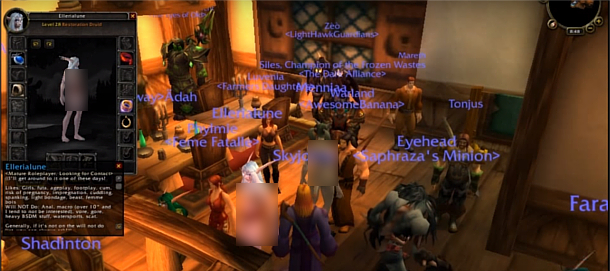 Although at first I wanted to publish some of the video to demonstrate what actually goes on, there ended up being too many graphic words for me to show anything. You can look up the video in the reference on your own at your own discretion, but know that these people list out on their character biographies all their sexual preferences, including transgender, torture, and bestiality. There are other games designed mostly around these concepts, for example, a game called Second Life. I was only made aware of this game recently, and it was one of the games that helped push me to write this article because it's frequent attendance by sexually demented players. I tried to think of a way to be able to publish something to prove to readers the kind of sexual depravity Second Life encourages, but it's so sickening and wicked, I can't. All I can tell you is that you can buy avatars (in-game character -- many that are sexually explicit) and participate in almost every sexual encounter imaginable.
And GOD saw that the wickedness of man was great in the earth, and that every imagination of the thoughts of his heart was only evil continually. |
This know also, that in the last days perilous times shall come. For men shall be lovers of their own selves, covetous, boasters, proud, blasphemers, disobedient to parents, unthankful, unholy, Without natural affection, trucebreakers, false accusers, incontinent, fierce, despisers of those that are good, Traitors, heady, highminded, lovers of pleasures more than lovers of God... from such turn away.
-2 Timothy 3:1-5
(Read "False Converts & Eternal Security" here at creationliberty.com for more details.)
Often, they're trying to lure in teens with the things of the world in order to make them a part of their church-ianity cult, rather than giving them the law of God so unbelievers can come to repentance. How can one expect an unbeliever to sanctify himself from the world while doing the things of the world?
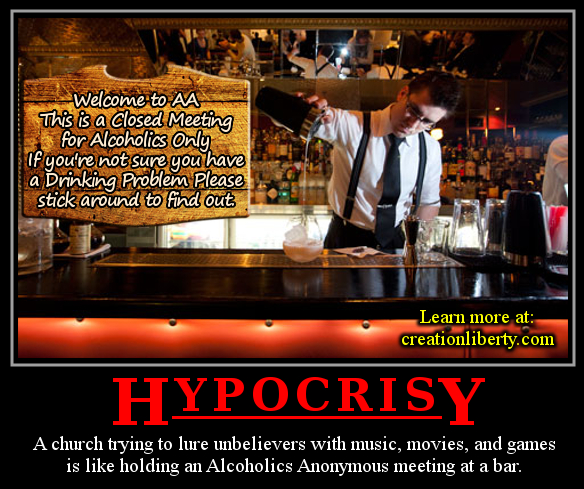
It's very difficult, hypocritical, and confusing to give someone the law of God, telling them that Christians are not of the world, when everything they're doing is of the world.
And now come I to thee; and these things I speak in the world, that they might have my joy fulfilled in themselves. I have given them thy word; and the world hath hated them, because they are not of the world, even as I am not of the world. I pray not that thou shouldest take them out of the world, but that thou shouldest keep them from the evil. They are not of the world, even as I am not of the world. Sanctify them through thy truth: thy word is truth.
-John 17:13-17
Love not the world, neither the things that are in the world. If any man love the world, the love of the Father is not in him. For all that is in the world, the lust of the flesh, and the lust of the eyes, and the pride of life, is not of the Father, but is of the world. And the world passeth away, and the lust thereof: but he that doeth the will of God abideth for ever.
-1 John 2:15-17
Let's say you have every game in existence, you've played and beaten all of them, you've found a way to slow down time so you can spend hundreds of years mastering every game there is to play... now what? What do you do next?
The gaming industry has done a fantastic job at getting people to ignore what's important. They'll spend their lives playing games, and never think about the end of their life that could come any day, any time; they want the thrill and joy the game has to offer, and don't want to have to work out their problems with mourning and grief.
Choosing rather to suffer affliction with the people of God, than to enjoy the pleasures of sin for a season;
-Hebrews 11:25
Submit yourselves therefore to God. Resist the devil, and he will flee from you. Draw nigh to God, and he will draw nigh to you. Cleanse your hands, ye sinners; and purify your hearts, ye double minded. Be afflicted [i.e. grief and hurt], and mourn, and weep: let your laughter be turned to mourning, and your joy to heaviness. Humble yourselves in the sight of the Lord, and he shall lift you up.
-James 4:7-10
At the very least, ask yourselves: What does it accomplish? The grand majority of video games accomplish absolutely nothing, and often keeps us from thinking about what's important, because thinking about what's important and considering the state of this world and the latter days to come will cause men to weep, and because they don't want to mourn, they instead occupy their minds with something that will amuse them, distracting them from the truth.
As a Christian, if you play some of these games, and you're not having any conviction about it, I would recommend that, every time to you see magic spells, relics, monsters, and mythical creatures of pagan lore, simply repeat Galatians to yourself:
Now the works of the flesh are manifest, which are these; Adultery, fornication... Idolatry, witchcraft... murders, drunkenness, revellings, and such like... they which do such things shall not inherit the kingdom of God.
-Galatians 5:19-21
For those of you Christians out there who do play video games on occasion, don't go announcing that to the world, and certainly don't go out trying to justify it to others, wounding their weak conscience. At least admit it for the wickedness it is, and the more you confess the truth while studying to show yourself approved unto God, you'll find that your interests in the things of the world (like video games) will fade over time.
Study to shew thyself approved unto God, a workman that needeth not to be ashamed, rightly dividing the word of truth.
-2 Timothy 2:15
For ye were sometimes darkness, but now are ye light in the Lord: walk as children of light: (For the fruit of the Spirit is in all goodness and righteousness and truth;) Proving what is acceptable unto the Lord. And have no fellowship with the unfruitful works of darkness, but rather reprove them.
-Ephesians 5:8-11
Abstain from all appearance of evil.
-1 Thessalonians 5:22
For it is God which worketh in you both to will and to do of his good pleasure. Do all things without murmurings and disputings: That ye may be blameless and harmless, the sons of God, without rebuke, in the midst of a crooked and perverse nation, among whom ye shine as lights in the world; Holding forth the word of life; that I may rejoice in the day of Christ, that I have not run in vain, neither laboured in vain.
-Phillipians 2:13-16











![There is No Saving Grace Without Repentance [creationliberty.com]](../images/store13a.jpg)
![Why Christians Should Study The King James Bible [creationliberty.com]](../images/store15a.png)
![Wolves in Costume: Kent Hovind [creationliberty.com]](../images/store11a.jpg)
![Corruptions of Christianity: Seventh-day Adventism [creationliberty.com]](../images/store09a.png)
![501c3: The Devil's Church [creationliberty.com]](../images/store07a.jpg)
![Feminism: Castrating America [creationliberty.com]](../images/store04a.jpg)



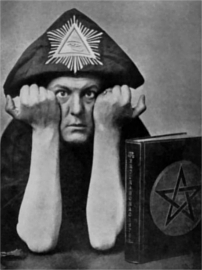
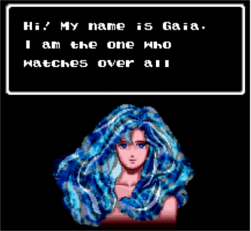







![Why Millions of Believers on Jesus Are Going to Hell [creationliberty.com]](images/store05a.jpg)
![Corruptions of Christianity: Catholicism [creationliberty.com]](http://www.creationliberty.com/images/store14a.jpg)
![False Prophet Profiles: Kim Clement [creationliberty.com]](http://www.creationliberty.com/images/store12a.jpg)
![Christmas: Rejecting Jesus [creationliberty.com]](http://www.creationliberty.com/images/store10a.jpg)
![Christian Music: For The Love of Money [creationliberty.com]](images/store08a.png)
![Psychology: Hoodwinked by the Devil [creationliberty.com]](images/store06a.jpg)
